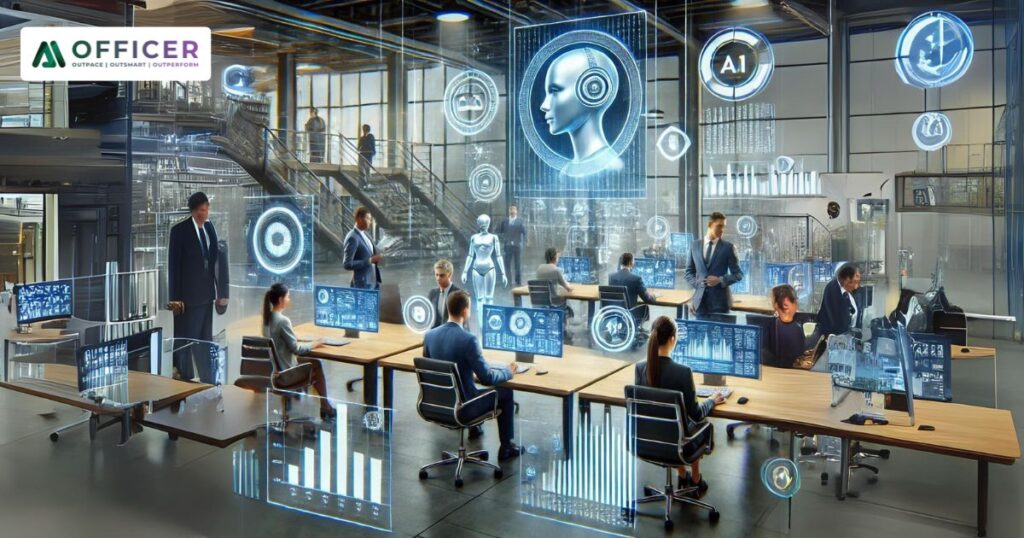
Businesses are scaling rapidly and Entrepreneurs, particularly those of SMEs and startups, face the challenge of assessing talent and processes efficiently.
Traditional assessment models—whether in employee evaluation, customer feedback or product quality checks—often fall short in providing a comprehensive, individualized approach. AI, the game changer that offers more than automation. It introduces personalized, equitable assessments that adapt to unique needs and offer unprecedented insights. But how exactly does this transformation occur?
Imagine an employee evaluation where the parameters are not one-size-fits-all but tailored to the individual’s specific role, responsibilities, and even learning style. AI allows us to move beyond standardized testing to a model that reflects real-world complexity.
From personalized employee performance assessments to adaptive customer feedback mechanisms, AI can fine-tune the experience to address the unique challenges of each individual or situation. This shift makes assessments not just fairer but far more insightful.
THE POWER OF PERSONALIZATION AND EQUITY IN ASSESSMENTS
Personalization in assessments means evaluating based on individualized data rather than generalized metrics. Equity ensures that the assessment tools are accessible, fair, and inclusive for all users. This combination not only provides more precise feedback but also reduces bias—a persistent problem in traditional assessment methods.
For SMEs and startups, this offers a strategic advantage: the ability to make more informed decisions based on data-driven, equitable evaluations.
CHALLENGES TRADITIONAL ASSESSMENTS POSE
- Lack of Personalization : Standard assessment methods often fail to consider the unique needs of individuals. Employees from diverse backgrounds may face different challenges, making uniform evaluation methods ineffective and potentially unfair.
- Bias in Assessments : Whether it’s recruitment or customer feedback, unconscious biases frequently taint traditional assessment models, leading to inaccurate conclusions and decisions.
- Time-Consuming Processes : Standard assessments require significant manual effort, which is impractical for SMEs and startups operating on tight budgets and timelines.
Now, let’s break down how AI provides personalized and equitable solutions.
HOW AI TRANSFORMS ASSESSMENTS
AI-driven assessments utilize vast amounts of data, natural language processing (NLP), and machine learning algorithms to analyze an individual’s or a situation’s unique characteristics. The goal is to offer personalized, real-time feedback that is free from human bias. Here’s how :
1. Adaptive learning models
AI can modify assessments in real time, adjusting difficulty levels based on an individual’s responses. For instance, employees undertaking skill development courses through AI-based platforms may find the training modules adapting to their current knowledge levels. This ensures that neither underperforming nor high-performing employees are left behind.
2. Bias mitigation
Machine learning algorithms can be trained to identify and neutralize biases. When AI analyzes data, it focuses purely on factual, performance-related metrics, eliminating the risk of subjective human judgment. Recruitment processes that leverage AI, for instance, can ensure that only merit-based factors are evaluated—leading to a more diverse and inclusive workforce.
3. Data-driven feedback
In contrast to traditional assessments, which provide generic results, AI analyzes vast datasets to offer more granular insights. For example, sales teams can benefit from AI-based tools that assess customer interactions and suggest tailored strategies based on patterns in client feedback. This personalized approach not only enhances performance but also creates a sense of fairness and inclusivity.
4. Automated, scalable assessments
For SMEs and startups, scalability is crucial. AI can handle a large volume of assessments—whether it’s evaluating customer satisfaction through chatbots or analyzing employee productivity—without additional resource strain. This allows businesses to conduct frequent assessments and act on real-time insights.
STEPS FOR SMES TO IMPLEMENT AI FOR PERSONALIZED AND EQUITABLE ASSESSMENTS
- Identify the assessment need : Pinpoint where traditional assessments fail—whether in employee evaluations, customer feedback or internal process optimization.
- Choose the right AI tools : Select AI tools designed for adaptive learning, bias mitigation, and data-driven insights. Ensure these tools are customizable to your industry and needs.
- Start with a pilot program : Before rolling out AI-powered assessments across the board, implement a pilot program to test its effectiveness. Use this period to gather feedback and tweak the system.
- Train the team : AI is only as effective as the team that uses it. Provide training to ensure that your staff understands how to utilize AI-driven assessments fully.
- Monitor and improve : Continually analyze the data provided by AI to refine and enhance your assessment strategies. AI tools learn over time, so they become more effective as you feed them more data.
At AI Officer, we specialize in delivering tailored AI solutions that align with your business goals. Our services include designing AI-powered tools for personalized assessments, employee productivity analysis, and customer feedback systems. Whether you’re a startup looking to scale or an SME needing to streamline internal processes, our team of AI experts can help you implement AI solutions that are data-driven, equitable and efficient. We ensure that you stay ahead of the curve in the ever-evolving AI landscape.
For more insights on AI trends and how they can revolutionize your business, be sure to follow our blogs. We’re always exploring the latest in AI technology to help you make informed decisions.
And remember—whether you’re looking to enhance employee assessments, streamline customer feedback, or implement AI across other business functions, our team at AI Officer is here to assist.
Let’s have a conversation about how AI can make your business assessments more personalized and equitable.





